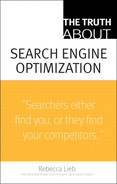As discussed in Truth 21, “Building links through online directories,” directory listings aren’t only an important link-building strategy. Listings in appropriate vertically oriented directories help to contextualize the focus, content, and scope of a website (and the business or organization that it represents). This listing can, in turn, help to contextualize and promote the site in vertical search listings.
We looked at this briefly in the last truth, in which we discussed how inclusion in directories such as Zagat, Citysearch, Yelp, Superpages, Judy’s Book, Yahoo! Local, travel guides, About.com, or regional websites, such as Boston.com, could help highlight a site’s local value and boost its ranking in local search results, while at the same time provide important clues regarding the context and relevancy of the site in question. Say a business is called “China Garden”. Is it a garden? A park? Is it a restaurant? A Chinese restaurant? A Chinese restaurant specializing in Szechuan cuisine in the Buckhead neighborhood of Atlanta, GA?
Search engines glean much of this kind of information (as, by extension, do searchers)—to such a great extent that online directories, which are searchable, are confused with search engines by some, and are even considered search engines by others. Broadly put, the fundamental difference between a directory and a “real” search engine is that the search engine is wholly automated and technology-based, whereas a directory is edited and reviewed by actual human beings.
This degree of editorial selectivity generally imparts a degree of quality, authority, and relevance that can exceed organic search engine results. This editorial selectivity also helps individual sites to rank higher in organic results by benefit of the links provided in the directories. Additionally, the text accompanying directory listings is often written, or at least vetted for content and accuracy, by these human editors so the messaging comes across as less “marketing-y”. These editors generally visit the site to check its content and overall quality, and to ensure that listings appear in the appropriate category.
Because of directories’ hierarchical structure, they often provide a systematic, orderly way for searchers to peruse the listings they contain. Generally, directories can searched by business vertical, by location, by services provided, and so on. For searchers, this can be much faster and more efficient than sifting through all the Chinese restaurants that come up in a search of the World Wide Web. Or in another of a myriad of examples, real estate listings might be sorted by two-bedroom, detached houses with gardens and garages within a specific zip code.
Because directories tend to be neat, orderly, organized, authoritative, and aligned around clearly defined topics, search engines like them. A lot. Search engine crawlers often use directories as a first stop in their quest for locating quality sites to add to their indices. They follow the links on directory sites to the listed websites, and then continue further and deeper in their quest to mine information. This is why directories were also discussed in depth in Part IV, “The Truth About Links.”
In addition to getting listed in general web directories such as Yahoo!’s or DMOZ (even from a purely SEO standpoint, it’s often worth considering paying a fee to do so), it’s worth the time and effort to seek out relevant vertical directories for your website and the products, services, or content it represents. Submitting a new listing is fast and relatively painless, and is often free or for a very small fee.
If it’s worth submitting a site to a directory, it’s worth paying attention to each individual directory’s submission guidelines—and then following them!
If you’re only allowed to submit to one category, submit to the most appropriate one. Don’t try to fool or trick the editors into including your site multiple times. If site descriptions are limited to 200 characters, or 100 words, stay within those limits and make every character in the copy count. (Perhaps you can even include some important keywords?)
Relevant copy that fits the category not only serves your site better, but also makes the editor’s job easier. “A really great website” just isn’t as helpful as “car, truck, and van rentals in California, Oregon, and Washington state”. Often, a directory requires listings to be factual and neutral rather than “sales-y”. But be careful to differentiate your site to give editors a reason to include it. If it sounds the same as others in the category, why should they bother? Emphasize the site’s value to visitors.
Many SEOs are careful to tweak description copy for individual directories. When each submission is ever so slightly individualized, it’s easier to track which directory submissions are making it into search results on the different search engines.
